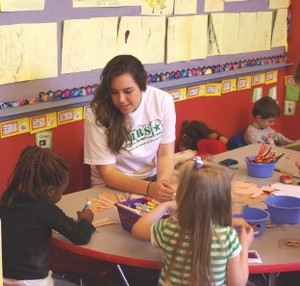 Civic engagement is a broad term that describes the process developing the knowledge, skills, and motivation to improve the quality of life in a community, through either political or non-political processes. Thomas Ehrlich, the author of Civic Engagement and Higher Education, states “a morally and civically responsible individual recognizes himself or herself as a member of a larger social fabric and therefore considers social problems to be at least partly his or her own; such an individual is willing to see the moral and civic dimensions of issues, to make and justify informed moral and civic judgments, and to take action when appropriate.” “Developing youth who take interest in understanding social and community issues is a fundamental philosophy of 4-H. This interest is a learned behavior and is best approached by meeting the youth where they are, rather than club leaders prescribing citizenship opportunities for them,” shares Stacey Ellison, the 4-H Regional Specialized 4-H Agent providing leadership for civic engagement. “To find that out, ask youth what are they interested in? What concerns them about their community? How do they see themselves as part of the solution?” A great resource for helping club leaders facilitate these types of discussions is the 4-H Civic Engagement Guide for Afterschool Clubs.
Civic engagement is a broad term that describes the process developing the knowledge, skills, and motivation to improve the quality of life in a community, through either political or non-political processes. Thomas Ehrlich, the author of Civic Engagement and Higher Education, states “a morally and civically responsible individual recognizes himself or herself as a member of a larger social fabric and therefore considers social problems to be at least partly his or her own; such an individual is willing to see the moral and civic dimensions of issues, to make and justify informed moral and civic judgments, and to take action when appropriate.” “Developing youth who take interest in understanding social and community issues is a fundamental philosophy of 4-H. This interest is a learned behavior and is best approached by meeting the youth where they are, rather than club leaders prescribing citizenship opportunities for them,” shares Stacey Ellison, the 4-H Regional Specialized 4-H Agent providing leadership for civic engagement. “To find that out, ask youth what are they interested in? What concerns them about their community? How do they see themselves as part of the solution?” A great resource for helping club leaders facilitate these types of discussions is the 4-H Civic Engagement Guide for Afterschool Clubs.
How do 4-H parents and volunteers know if they are “doing” civic engagement in their club? You know you are on the right track when civic engagement opportunities:
- Provide meaningful service that directly relates to community or youth needs.http://www.4-h.org/about/youth-development-research/positive-youth-development-study/
- Provide supervision by caring adults who have been screening and oriented to their roles.
- Teach critical skills, such as subject matter knowledge or skills (babysitting, CPR, etc.) and/or life skills like problem solving, leadership, teamwork and life skills
- Foster youth adult partnerships. Meaningful youth engagement views youth as equal partners with adults in the decision-making process. Programs and activities are developed with youth, rather than for youth. In this kind of equal partnership, both adults and young people need to be fully engaged, open to change in how things are done, and share a unified vision for the partnership.
- Adults and stakeholders view youth as a resource. Youth programs are strengthened when they involve and engage youth as equal partners, ultimately providing benefits both for the program and for the involved youth. Positive youth development also has its origins in the field of prevention. In the past, prevention efforts typically focused on single problems before they surfaced in youth, such as teen pregnancy, substance abuse and juvenile delinquency.
- Celebrate success and recognize youth (ex: 4-H Awards & Recognition Programs, 4-H program awards, ribbons, plaques, etc.)
Youth can provide added energy, ideas, and value to organizations through youth volunteering efforts. Stacey shares one of the easiest ways for clubs to get involved and have an impact in not only their community, but statewide: “One of our biggest impacts in Florida 4-H has been through our annual state service projects. While clubs across the state undoubtedly have tremendous local success in various projects, the state project seeks to join the efforts of all Florida 4-Hers to benefit one particular cause. With more than 230,000 4-H members working towards the same cause- we can make tremendous impact on the state of Florida! This year’s state 4-H service project is, “Clothing the World.” This is a project selected by the youth members of our Florida 4-H Executive Board State Project committee. The youth saw a need to provide for one of the most basic needs of people around the world- clothing. Clubs are encouraged to conduct their own clothes drives and volunteer with like-purposed charitable organizations to benefit their local communities.”
Civic engagement is major factor in 4-H positive youth development. The Tufts Study on Positive Youth Development found that compared to their peers, 4-H’ers are:four times more likely to make contributions to their communities and two times more likely to be civically active. If you would like to help Florida 4-H grow the next generation of civically engaged young adults, consider becoming a volunteer. Visit http://florida4h.org/volunteer or contact your local UF IFAS County Extension Office for more information.
Resources: www.florida4h.org/, https://edis.ifas.ufl.edu/wc073 (EDIS Publication #AEC392 – Learning by Doing: Utilizing Service-Learning Projects), www.youth.gov, www.IndependentSector.org
 0
0
